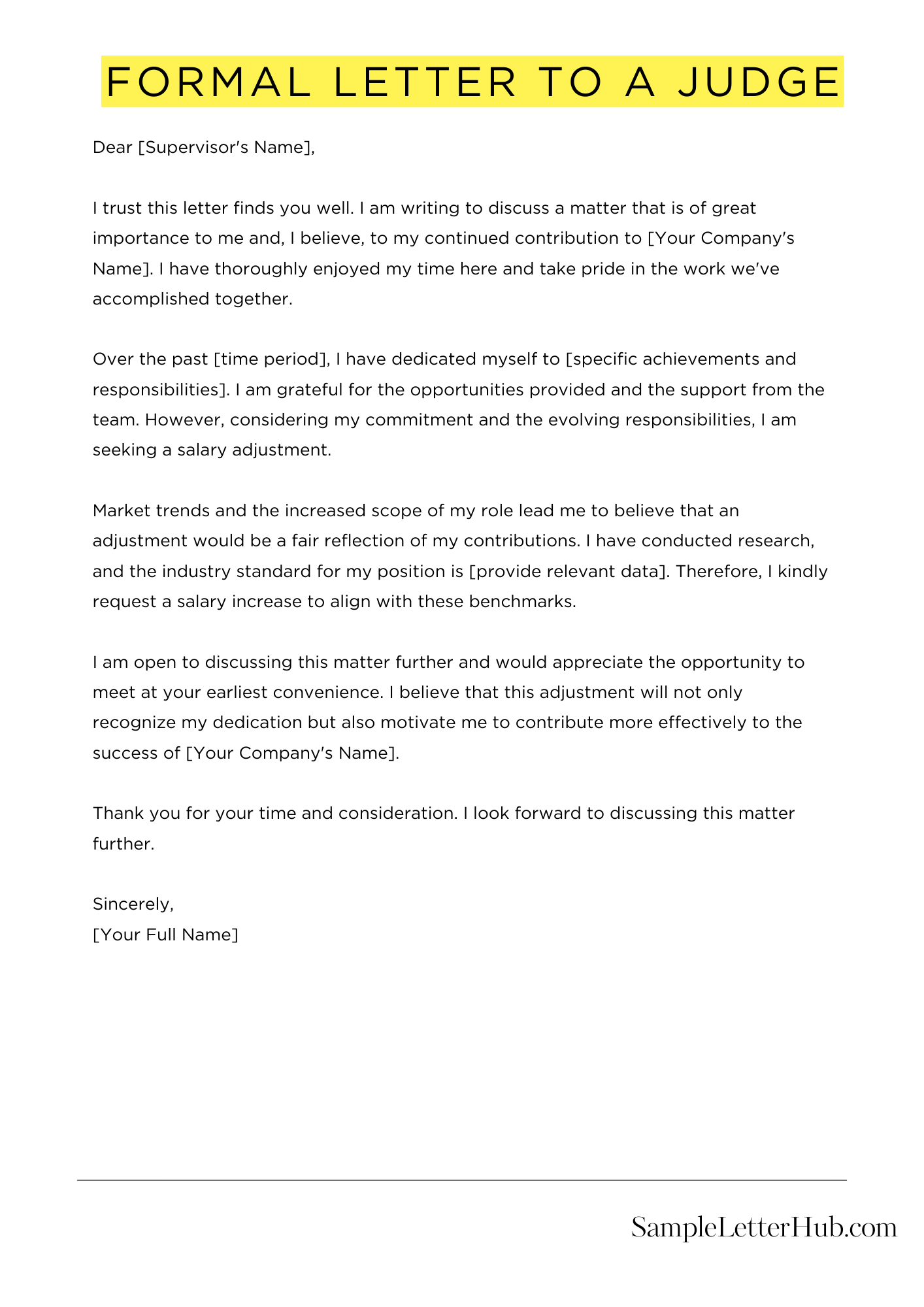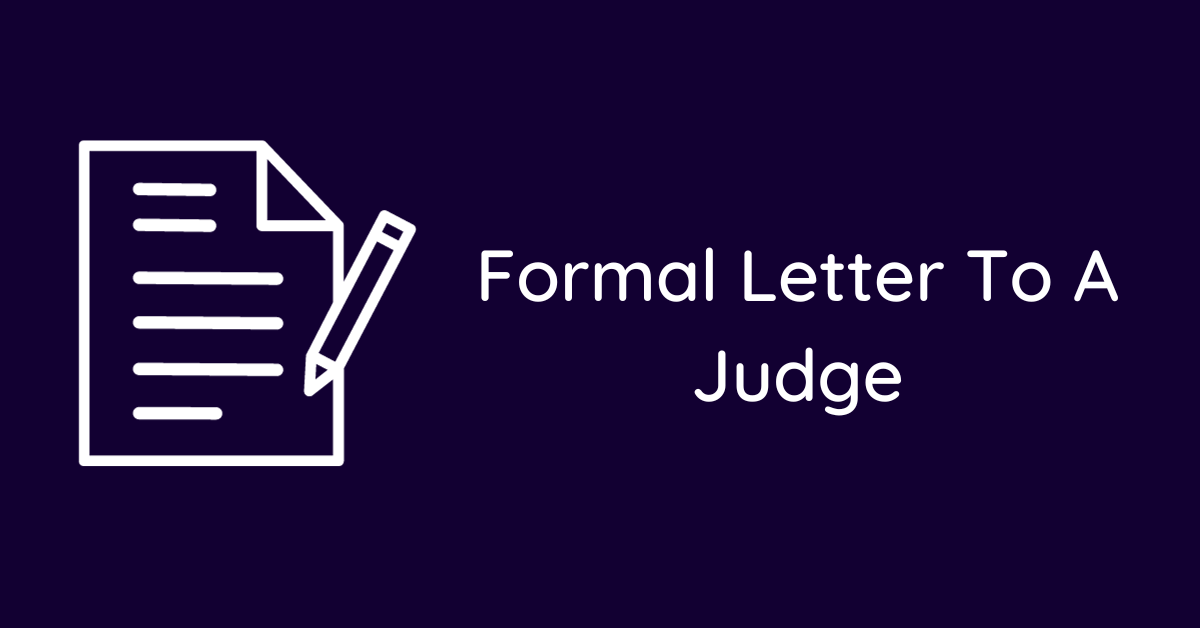A formal letter to a judge is a written communication that is addressed to a judge in a court of law. The purpose of this letter is to provide information or request a specific action from the judge. It is important to use a formal tone and follow proper etiquette when writing a letter to a judge.
In this article, we will provide templates and examples of formal letters to a judge. These samples will help you understand the format and structure of a formal letter to a judge.
Whether you are writing a letter to request leniency for a loved one or to provide evidence in a case, our samples will make it easier for you to write a clear and concise letter.
By using our templates and examples, you can ensure that your letter is professional and respectful. We understand that writing a letter to a judge can be intimidating, but with our help, you can write a letter that effectively communicates your message.
So, let’s get started and learn how to write a formal letter to a judge.
Formal Letter To A Judge
Dear Honorable [Judge’s Last Name],
I hope this letter finds you well. I am writing to bring to your attention [provide a concise overview of the issue or case]. I believe that a fair and just resolution can be achieved through a careful consideration of the facts and circumstances surrounding this matter.
It is important to emphasize [key points or evidence] that I believe warrant your consideration. [Add any relevant legal references or precedents if applicable.]
In light of the aforementioned facts, I kindly request your thoughtful review and fair judgment in this matter. I have full confidence in the legal system and your ability to ensure justice is served.
Thank you for your time and attention to this matter. I trust that your wisdom and experience will guide the proceedings toward a just resolution. I appreciate the court’s dedication to upholding the principles of justice.
If there are any additional documents or information needed, please do not hesitate to contact me at [your contact information]. I am fully committed to cooperating with the court to ensure a smooth and equitable resolution.
Thank you for your consideration.
Sincerely,
[Your Full Name]
Letter To Court
Dear Honorable Members of the Court,
I trust this letter finds you in good health and high spirits. I am writing to bring a matter of great importance to your attention, pertaining to [briefly describe the nature of the issue].
Upon careful consideration of the circumstances surrounding this case, it has come to my attention that [provide key details or concerns]. It is my sincere hope that the court will consider these factors in rendering a fair and just decision.
Furthermore, I would like to draw your attention to [any relevant evidence or legal precedents] that support my position in this matter. I believe a thorough examination of these aspects will contribute to a comprehensive understanding of the situation.
Your wisdom and impartiality are crucial in ensuring a fair resolution. I am confident that the court will weigh all facts judiciously and make a decision that upholds the principles of justice.
If additional information or clarification is required, please do not hesitate to contact me at [your contact information]. I am committed to cooperating fully to facilitate a swift and equitable resolution.
Thank you for your attention to this matter. Your dedication to the pursuit of justice is deeply appreciated.
Sincerely,
[Your Full Name]
Formal Letter To A Judge For Court
Your Honor,
I trust this letter finds you well. I am writing to bring to your esteemed attention a matter of great significance regarding case [Case Number].
The purpose of this correspondence is to humbly request your careful consideration of [briefly explain the nature of the issue]. It is my sincere belief that a thorough examination of the facts and circumstances will contribute to a fair and just resolution.
I would like to draw attention to [specific details, evidence, or legal points] that I believe are crucial for a comprehensive understanding of the case. I am confident that your wisdom and impartiality will guide the proceedings toward a just decision.
If there is a need for additional information or clarification, please do not hesitate to contact me at [your contact information]. I am fully committed to cooperating with the court to ensure a thorough and equitable resolution.
Thank you for your time and attention to this matter. I express my utmost respect for the court and its commitment to upholding justice.
Sincerely,
[Your Full Name]
Letter To A Judge Regarding A Case
Your Honor,
I hope this letter finds you well. I am writing to respectfully bring attention to case [Case Number] and to request your thoughtful consideration of the matter at hand.
It is my understanding that the details of this case may be intricate, and I believe that a thorough examination of the facts is crucial for a fair and just resolution. The complexities involved necessitate a careful evaluation to ensure justice is served.
I would like to highlight certain aspects of the case, including [specific details or evidence], which I believe warrant your attention. These elements, when considered judiciously, may contribute to a more comprehensive understanding of the situation.
If there are any additional materials required or if clarification is needed, I am more than willing to provide the necessary information. I believe in the integrity of the legal system and am confident that your wisdom will guide the proceedings toward a fair and equitable resolution.
Thank you for your time and consideration of this matter. Your dedication to justice is deeply appreciated.
Sincerely,
[Your Full Name]
Letter To A Judge As A Victim
Your Honor,
I am writing to you today as a victim in the case of [Case Number], and I appreciate the opportunity to share the impact this incident has had on my life.
The emotional and physical toll of the events surrounding this case has been substantial. As I navigate the aftermath, it is my hope that the court will consider the personal hardships and trauma that I have endured.
While I understand the legal complexities involved, I want to convey the profound impact on my sense of security and well-being. This experience has left lasting scars, affecting not only me but also my loved ones.
I trust in the court’s commitment to justice, and I believe that understanding the full scope of the consequences will contribute to a fair and informed decision. It is my sincere wish that the court considers the human aspect alongside the legal aspects of this case.
If there are any further details or insights needed to better comprehend the extent of the impact, I am willing to provide additional information. I appreciate your consideration of my perspective in this matter.
Thank you for your attention and dedication to ensuring justice is served.
Sincerely,
[Your Full Name]

How to Write a Formal Letter to a Judge
Writing a formal letter to a judge can be a daunting task, especially if you have never done it before. However, it is important to know how to write a letter that is clear, concise, and respectful. In this article, we will guide you through the process of writing a formal letter to a judge.
1. Understand the Purpose of the Letter
Before you start writing, it is important to understand the purpose of the letter. A formal letter to a judge is usually written to request leniency or to provide information that may be relevant to a case. It is important to keep in mind that the letter should be written in a respectful and professional tone.
2. Use Proper Formatting
When writing a formal letter to a judge, it is important to use proper formatting. The letter should be typed and printed on a clean, white sheet of paper. Use a professional font such as Times New Roman or Arial, and use a font size of 12. The letter should be single-spaced, with double-spacing between paragraphs.
3. Address the Judge Correctly
When addressing the judge, it is important to use the correct title. The judge should be addressed as “”Honorable”” followed by their full name. For example, “”Honorable John Smith.”” If you are unsure of the judge’s name, you can address the letter to “”The Honorable Judge of the (Name of Court) Court.””
4. State the Purpose of the Letter
In the first paragraph of the letter, state the purpose of the letter. Be clear and concise, and explain why you are writing to the judge. If you are requesting leniency, explain why you believe the judge should consider your request. If you are providing information, explain why the information is relevant to the case.
5. Provide Relevant Information
In the body of the letter, provide any relevant information that may be helpful to the judge. Be sure to provide specific details and examples to support your request or argument. If you are providing information, be sure to cite your sources and provide any necessary documentation.
6. Close the Letter Respectfully
In the closing paragraph of the letter, thank the judge for their time and consideration. Be sure to close the letter respectfully, using a professional tone. Sign the letter with your full name and include any contact information that may be necessary.
7. Proofread and Edit
Before sending the letter, be sure to proofread and

FAQs About Formal Letter To A Judge
1. What is the purpose of a formal letter to a judge?
A formal letter to a judge is typically written to request leniency or to provide information that may be relevant to a case. It is important to keep in mind that the letter should be respectful and professional in tone.
2. How should I address the judge in my letter?
When addressing a judge in a formal letter, it is appropriate to use the title “”Honorable”” followed by the judge’s full name. For example, “”Dear Honorable John Smith.””
3. What should I include in my letter?
Your letter should include a brief introduction, a clear explanation of the purpose of the letter, and any relevant information or evidence that may be helpful to the judge. It is important to keep the letter concise and to the point.
4. Can I include personal opinions or emotions in my letter?
While it is important to be honest and sincere in your letter, it is best to avoid including personal opinions or emotions. Stick to the facts and provide any relevant information that may be helpful to the judge.
5. Should I have my letter reviewed by an attorney before sending it?
If you have an attorney representing you in the case, it is a good idea to have them review your letter before sending it. They can provide guidance on what information to include and how to present it in a way that is most likely to be effective.
6. How should I format my letter?
Your letter should be formatted like a professional business letter, with your name and contact information at the top, followed by the date, the judge’s name and address, and a formal salutation. Use a clear and easy-to-read font, and keep the letter to one page if possible.
7. How should I close my letter?
End your letter with a formal closing, such as “”Sincerely”” or “”Respectfully,”” followed by your name and signature. Be sure to proofread your letter carefully before sending it to ensure that it is free of errors and conveys the message you intend.
Related:
- Noise Complaint Letter To Landlord (5 Samples)
- 1 Year Extension Letter About To Expire (10 Samples)
- 10 Day Notice To Vacate Letter South Carolina (10 Samples)
- 10 Day Right To Redemption Letter (10 Samples)
- 10 Day Rule To Show Cause Letter (10 Samples)

